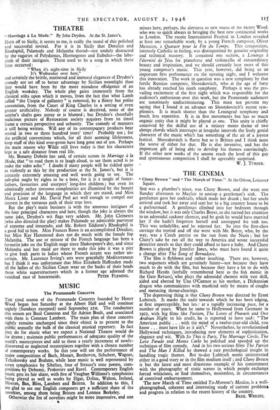THE ,CINEMA
" Cluny Brown " and " The March of Time." At the Odeon, Leicester Square.
SHE was a plumber's niece, was Cluny Brown, and she went one Sunday afternoon to Mayfair to unstop a gentleman's sink. The gentleman gave her cocktails, which made her drunk ; but her uncle arrived and took her away and sent her to a big country house to be a parlourmaid. A gentleman climbed into her bedroom through the window, but it was only Charles Boyer, so she turned her attention to an adenoidal cockney chemist, and by gosh he would have married her if she hadn't forgotten herself and unstopped his sink too. This was unladylike, and he rejected her. So into the first-class carriage she trotted and off she went with Mr. Boyer, who, by the way, was a Czech patriot on the run from the Nazis ; but for Cluny's sake he ran all the way to America and wrote successful detective novels so that they could afford to have a baby. And Cluny Brown is played by Jennifer. Jones, who must have found it quite a change after The Song of Bernadette.
The film is flyblown and rather insulting. There are, however, two sequences which are genuinely hinny—not because they have much to do with the 'film, but because they have a lot to do with Richard Haydn (joyfully remembered here as the fish mimic in the Gate Revues), who plays the adenoidal chemist with vast skill, aided and abetted by Una O'Connor as his mother, a Dickensian dragon who communicates with mankind only by means of coughs and menacing throat-clearings.
The depressing thing is that Cluny Brown was directed by Ernst Lubitsch. It marks the nadir towards which he has been edging, at first imperceptibly, but lat.: at a rapidly increasing pace, for a number of. years. When he came to Hollywood from Germany in 1922, with big films like Passion, The Loves of Pharaoh and One Arabian Night to his credit, he is reported to have said : " The American public . . . with the mind of a twelve-year-old child, you know .. must have life as it ain't." Nevertheless, he revolutionised Hollywood techniques, introducing new elements of sophistication, elegance and wit. With So This is Paris, The Marriage Circle, The Love Parade and Monte Carlo he polished and speeded up the technique of film comedy. And in his two serious films The Patriot and The Man I Killed he showed a rare psychological insight in handling tragic themes. But to-day Lubitsch seems uninterested either in a good story or in the film medium itself ; and Cluny Brown is but the latest and most disastrous example of his contentment with the photography of static scenes in which people exchange forced witticisms, or find themselves, motionless, in circumstances of contrived embarrassment.
The new March of Time entitled To-Morrow's Mexico, is a well- photographed, coherent and interesting study of current problems and progress in relation to the recent history of the country. BASIL WRIGHT.


























 Previous page
Previous page